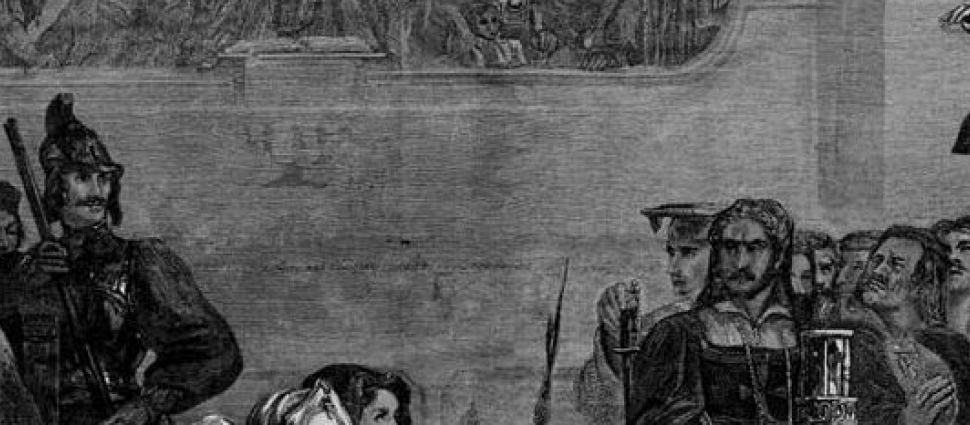John Knox on Reprobation

Nov 3, 2016
The election of only some to life necessarily implies the existence of a group of non-elect, or reprobate. And so, just as Knox affirmed his belief in election, so he held that “from the same eternitie he hath reprobate others, whom for most just causes, in the tyme appointed to his judgement, he shall adjuge to tormentes and fier inextinguible.” (Works, 5:61) However, while election and reprobation were inseparable doctrines Knox, and the wider Reformed tradition, distinguished between them, saying they were not “of the same sorte.” (Works, 5:124)
Election and Reprobation Distinguished
This asymmetry can be seen in Knox’s clear distinction between the cause of reprobation and the cause of condemnation. The reprobates’ “wickedness” and “manifest rebellion” was not the cause of their reprobation, but it was a “just cause of their condemnation” (Works, 5:71). Thus there were “degrees and just causes” which came between the decree of reprobation and actual condemnation which was on the basis of sin (Works, 5:105). God, for Knox, was “the cause of no man's damnation, but sinne in which they are fallen, is the very cause which all reprobates do find in themselves” (Works, 5:284). By way of contrast, God is the cause of the elect’s salvation.
God not Passive
However, this is in no sense to say that God was passive in reprobation. Reprobation was not merely an act of “permission” but a “willing” act of God (Works, 5:331). To deny that God “effectually worked” in reprobation, for Knox, was to deny the plain teaching of Scripture in places like Isaiah 45:7 and Amos 3:6 (Works, 5:335). Knox was conscious that here he was in danger of making God responsible for sin and so he protested his agreement with Calvin that “sinne was ever hatefull to God ... I utterly denie him to be the author of sinne” (Works, 5:170). God did not “move” people to sin, rather the “moving” agent was a combination of the Devil and a sinful and corrupt nature which delighted in sin. However, God did not simply give “ydle permission” for sin, rather “God giveth over the wicked into a lewd and reprobate mynd” and this is more than bare permission (Works, 5:346).
Shameful Parodies
However, Knox laboured against false conclusions from his teaching such as, “Let the Reprobate do what they can, yet they must be damned” (Works, 5:394). This he regarded as a shameful parody of his position. He held that “whosoever declineth from evill, and constantly to the end doth good, shall most certenly be saved” (Works, 5:394). That the reprobate wilfully refused to believe meant their damnation is just. However, these rejections of false conclusions drawn from his teaching should not be taken as a “softening” of Knox’s position. Rather, Knox believed that reprobation served ultimately to magnify the glory of God in his justice (Works, 5:161). And, for him, God was more concerned with his glory that the fate of an individual impenitent sinner (Works, 5:41). This is reprobation at its starkest.
Knox and Later Teaching on Reprobation
It is not difficult to see the continuity between the teaching of Knox and later 17th century theologians. James Durham (1622-1658) too held that “the decree of Election doth necessarily infer the decree of Reprobation; for where there is an election of some, there is a preterition of others” (A Commentarie Upon the Book of the Revelation [Willow Street, PA.: Old Paths Publications, 2000], 400). He also held there was an important asymmetry to note here between election and reprobation. While the elect were saved because of the decree of election, the reprobate are damned not because of the decree of reprobation but because of their own “impenitence” and “guilt” (Revelation, 946). Even the noted supralapsarian Samuel Rutherford could define reprobation as an act “whereby he decreeth to pass by some and to leave them to the heardness of their own heart” (“Rutherfurd’s Catechism,” in Alexander Mitchell, ed., Catechisms of the Second Reformation [London: James Nesbit & Co., 1886], 163).
Preaching Reprobation
Reprobation then, for Knox, and others is a revealed truth. And therefore it is part of “the whole counsel of God” which must be preached (Acts 20:27). However as Westminster Confession 3:8 reminds us, “The doctrine of this high mystery of predestination is to be handled with special prudence and care.” And nowhere is this care needed more than in preaching about reprobation. It can too easily be used to encourage fatalism. Calvin rightly warned against those who used the doctrine of election or reprobation to make “the statement that they who hear will not believe because they have been condemned.” He called this “cursing rather than teaching” and said “Augustine therefore, rightly bids such men begone from the church, as foolish teachers or perverse and foreboding prophets” (Institutes 3.23.14). Teach then the whole counsel of God as Knox did, but teach it with care.





